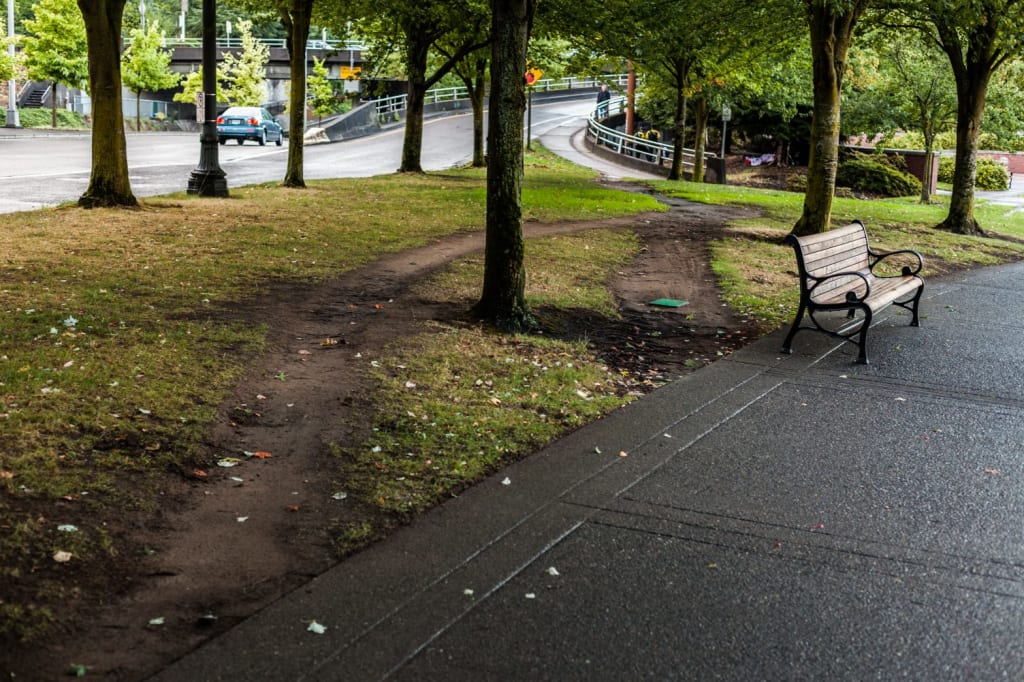Desire Paths and the Rise of Individualism
What can our unconscious behaviors teach us?

In my city, as I'm sure there are in yours, there is a handful of parks. At a glance, they offer a small escape from the grey of the city to the green of nature, the effects of which have been proven to be extremely beneficial to our mental and physical health. However, when you look more closely, there is much more to these green spaces than simply trees, flowers, and grass.
Next time you find yourself in a park, look down and notice the surface that you are walking on. Is it brick? Tarmac? Grass? Has it been put there purposefully, or has it grown? These possibilities offer a black-and-white perspective of what these surfaces could be; man-made or natural. This is not the case, as there is a third category that combines the two - desire paths. A desire path is a term that is used to define the phenomenon of humans choosing to walk a different path from those laid ahead of them, in such frequency that it impacts the landscape. Think back to your city parks again; are all of the paths laid in stone? Or are many of them muddy trails that appear to slice and intersect with the other, more intentional paths?
I have been obsessed with the idea of these paths for quite some time, as I love the idea of people working towards what they know to be a worthwhile goal, unconsciously and without communication. It portrays a wonderful image of humans, providing a snapshot of what we can achieve when we work towards the same end, consistently. Unfortunately, they are also a bleak reminder that this cooperation does not extend to many areas of modern culture.
Individualism has been one of the most prevalent attitudes in Western culture for many years, particularly post-WW2. It fosters the belief that each individual must create and live by their own ideals and values, forcing them to find meaning through the development and betterment of self. While this may sound liberating, it has simply made us more isolated. One obvious effect of this is that we are suspicious of the actions of others, even when they are beneficial to us, as we believe that they are probably acting in self-interest. It can often appear ridiculous that a person with nothing to gain may take time to assist us, often at personal cost. This hinders our ability to work together, as we retain the idea that we must climb to the top, alone, and that any help that we receive along the way pails in comparison to the effort that we have had to make. This has not been the case before. This should not be the case now. This should never be the case again.
This has also led us, as a society, to develop incredibly warped views of our work-life balance. When we are not working, we are often crippled with guilt when we partake in activities that we see as a waste of time, as they do not serve to progress our lives in a meaningful way. This creates a disconnect in our brain, as we cannot relax, and yet we cannot work all the time. This results in a cycle, where being unhappy in one aspect of life, be it work or free time, bleeds relentlessly into the other. And yet, due to our own beliefs, we do this to ourselves so that we may continue, ceaselessly, towards whatever goal that we see for ourselves. When we do not meet these expectations, we experience a crisis of self, resulting in periods of low mental health, as we believe that other people are much more successful in the pursuit of their ideal selves.
And so, this leads us to the crux of the problem. It is reasonable to say that, with the right assistance and advice, many problems turn out to be much less of a mountain to move than initially thought. So, why don't we seek the help of those around us? Through the compounding nature of individualistic culture, we appear to become more and more entrenched in the ways of thinking that we have been born into - I am the most important thing in my life, and anything else is nothing but a footnote in the story of me. As such, we can even grow to resent assistance, as they can corrupt the sense of self that we have constructed around the idea that "I, alone, am responsible for the way that I am and the life that I live." As a species, we could have not made it past the initial stages of evolution without teamwork. Why is it that we continue to run from that which we once were, instead of admitting that, by definition, growth requires building on that which we started with? The sooner that we can shed the idea that we are the most important thing in the world, the sooner that our lives will become much easier.
There is a certain freedom that comes from admitting to one's self that everyone around us lives similarly complicated lives as we do, coping with their own issues and problems, playing out the story that their life is. By doing so, we admit that we are part of something much bigger than ourselves, and so the need to define one's life by huge, sweeping actions that shape the future begins to melt away. By simply assisting people in creating a better future for themselves and for others, you become part of shaping the future in ways that you may never see, but will know is true. Fear may be the mind-killer, but compassion, kindness, and collective nurture are what bring it into bloom.
This brings us back around to the topic of desire paths. If there is anything that you take from this brief conversation about them, let it be this - when you next walk through a park, take a walk across the grass. Look behind you as you go, and notice that the ground remains unchanged. Your footsteps, today, alone, will not create the sweeping paths and trails that you see in other areas of the park. You can continue this exercise for as many days in a row as you like - it makes little difference. Although you will wear out a trail in time, imagine if you could have one other person walking this path. Then ten. Then one hundred. Then one thousand. You could have a path within an afternoon! This is the kind of thinking that propels true, fundamental change, and all it takes, to begin with, is one person choosing to walk on the grass.
I take great comfort in the existence of these desire paths - they remind me that, in spite of everything, we continue to work together. These walkways connect people who will never meet, through time and collective action, and remind us that the actions that are taken together provide results magnitudes greater than the actions of ourselves alone. I suggest that you take solace in these remarkable, unremarkable trails too - there is a way out of here, and we will find it together. No matter how alone you find yourself, know that this trail has been walked before, and you can break free from it. Do not be afraid to take the first step on this path, as they exist as much within yourself as they do in the parks. Sometimes, all you need is someone to walk alongside you. And there is no shame in this fact.
About the Creator
Daniel Speirs
I'm here to try out different writing genres and styles!





Comments
There are no comments for this story
Be the first to respond and start the conversation.